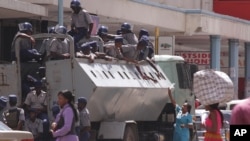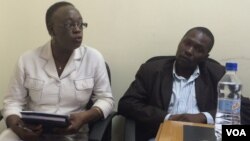Opposition lawmakers in Zimbabwe stormed out of parliament this week after debate was blocked on a pro-democracy activist who was abducted Monday. Civic organizations say they are shocked that African states have remained silent on the disappearance of Itai Dzamara.
Rights groups plan to ask the African Union and Southern African Development Community to remove President Robert Mugabe from chairing those bodies if his government does not act on the disappearance.
Zimbabwean police say the wife of Dzamara last saw her husband when five men forced him into a car before driving off on Monday.
Since then, the opposition and civic organizations have been accusing President Mugabe’s government of being behind the abduction. This is because the activist had been staging protests to force Zimbabwe’s 91-year-old leader to step down for failing to prop up the country’s economy.
In parliament this week, Vice President Emmerson Mnangagwa denied allegations that Harare had an issue with the missing activist.
“We are a democratic society and anybody in this country who commits a crime must account for the crime that is committed. That is why we have institutions like the Zimbabwe Republic Police to deal with this.” I can assure the House that [Dzamara’s abduction] is a barbaric act and we want those responsible to come to book,” said Mnangagwa.
On Friday, a High Court judge ordered Zimbabwe’s security agents, including the police, to ensure that the missing Dzamara is released or brought to court.
History of abductions
That followed an application by Zimbabwe Lawyers for Human Rights who are leading efforts to locate Dzamara. Simeon Mawanza of Amnesty International says there is every reason to worry about the missing Dzamara despite assurances from Vice President Mnangagwa that the abductors will be brought to account.
"Zimbabwe has a history of abductions and most of them were politically motivated. In 2008, dozens of citizens were abducted mainly for their political activism. Some were found dead, some were seriously tortured," said Mawanza.
One of those lucky to have beeen left alive is Jestina Mukoko, the head of Zimbabwe Peace Project, a civic organization that documents cases of human rights abuses. In December 2008 Mukoko was abducted from her home under the cover of darkness and spent three weeks in an undisclosed location where she says she was routinely tortured by state security agents.
Mukoko says the abduction of Dzamara has been very unsettling for her.
“I think, for me, it is really frightening that after my case the government would continue to abduct people in the same way that they have abducted Itai Dzamara. I cannot express the fear that have I have in me. It is like I am walking the same route that I walked on the 3rd of December, 2008,” said Mukoko.
Mukoko is part of the group that wants to approach regional bodies – the SADC and the African Union – to remove Mugabe from his positions in those bodies if Dzamara is not found. Mugabe is the current chairman of both bodies.
The civic organizations noted that no African government has voiced concern over the missing activist.





